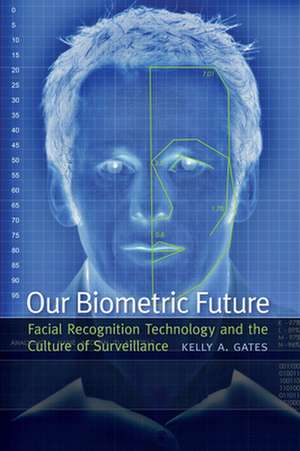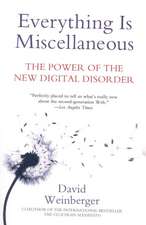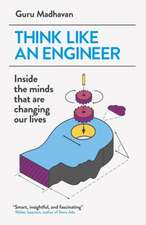Our Biometric Future – Facial Recognition Technology and the Culture of Surveillance: Critical Cultural Communication
Autor Kelly A. Gatesen Limba Engleză Paperback – 22 ian 2011
| Toate formatele și edițiile | Preț | Express |
|---|---|---|
| Paperback (1) | 229.17 lei 43-57 zile | |
| MI – New York University – 22 ian 2011 | 229.17 lei 43-57 zile | |
| Hardback (1) | 528.23 lei 43-57 zile | |
| MI – New York University – 22 ian 2011 | 528.23 lei 43-57 zile |
Din seria Critical Cultural Communication
-
 Preț: 216.43 lei
Preț: 216.43 lei -
 Preț: 199.97 lei
Preț: 199.97 lei -
 Preț: 200.53 lei
Preț: 200.53 lei -
 Preț: 173.10 lei
Preț: 173.10 lei -
 Preț: 200.53 lei
Preț: 200.53 lei -
 Preț: 215.61 lei
Preț: 215.61 lei -
 Preț: 202.18 lei
Preț: 202.18 lei -
 Preț: 173.62 lei
Preț: 173.62 lei -
 Preț: 199.15 lei
Preț: 199.15 lei -
 Preț: 215.33 lei
Preț: 215.33 lei -
 Preț: 200.80 lei
Preț: 200.80 lei -
 Preț: 215.80 lei
Preț: 215.80 lei -
 Preț: 226.09 lei
Preț: 226.09 lei -
 Preț: 226.46 lei
Preț: 226.46 lei -
 Preț: 243.58 lei
Preț: 243.58 lei -
 Preț: 240.27 lei
Preț: 240.27 lei -
 Preț: 227.62 lei
Preț: 227.62 lei -
 Preț: 223.80 lei
Preț: 223.80 lei -
 Preț: 226.67 lei
Preț: 226.67 lei -
 Preț: 223.80 lei
Preț: 223.80 lei -
 Preț: 241.26 lei
Preț: 241.26 lei -
 Preț: 224.18 lei
Preț: 224.18 lei - 23%
 Preț: 529.69 lei
Preț: 529.69 lei -
 Preț: 227.62 lei
Preț: 227.62 lei -
 Preț: 241.64 lei
Preț: 241.64 lei - 23%
 Preț: 530.46 lei
Preț: 530.46 lei -
 Preț: 218.85 lei
Preț: 218.85 lei - 23%
 Preț: 530.46 lei
Preț: 530.46 lei - 19%
 Preț: 447.25 lei
Preț: 447.25 lei -
 Preț: 226.67 lei
Preț: 226.67 lei -
 Preț: 229.55 lei
Preț: 229.55 lei - 23%
 Preț: 529.86 lei
Preț: 529.86 lei -
 Preț: 213.59 lei
Preț: 213.59 lei - 23%
 Preț: 524.24 lei
Preț: 524.24 lei
Preț: 229.17 lei
Nou
Puncte Express: 344
Preț estimativ în valută:
43.85€ • 45.90$ • 36.50£
43.85€ • 45.90$ • 36.50£
Carte tipărită la comandă
Livrare economică 31 martie-14 aprilie
Preluare comenzi: 021 569.72.76
Specificații
ISBN-13: 9780814732106
ISBN-10: 0814732100
Pagini: 274
Ilustrații: black & white illustrations, black & white halftones
Dimensiuni: 151 x 227 x 22 mm
Greutate: 0.45 kg
Editura: MI – New York University
Seria Critical Cultural Communication
ISBN-10: 0814732100
Pagini: 274
Ilustrații: black & white illustrations, black & white halftones
Dimensiuni: 151 x 227 x 22 mm
Greutate: 0.45 kg
Editura: MI – New York University
Seria Critical Cultural Communication
Cuprins
Contents; Acknowledgments vi; Introduction: Experimenting with the Face 1; 1. Facial Recognition Technology from the Lab to the Marketplace 34; 2. Police Power and the Smart CCTV Experiment 83; 3. Finding the Face of Terror in Data 129; 4. Inventing the Security-conscious, Tech-savvy Citizen 164; 5. Automated Facial Expression Analysis and the Mobilization of Affect 197; Conclusion 252; Notes 266; Bibliography 341; Index; About the Author 364
Recenzii
"Gates deftly explores the cultural work performed by facial recognition technologies, and in so doing demonstrates considerable skill in the critical analysis of emergent technologies. This book represents a significant contribution to our understanding about the ongoing elaboration of surveillance society throughout the globe. Anne Balsamo, University of Southern California, author of Technologies of the Gendered Body: Reading Cyborg Women and Designing Culture: The Technological Imagination at Work
"A groundbreaking study. Our Biometric Future considers facial recognition technology through its wide range of political entanglements, such as post-9/11 security measures, the management of urban populations in commercial districts, and self-representation in online social networking sites. Across these contexts, Gates shows how facial recognition's political effects have developed in spite of the fact that the technology does not actually work very well. Written with style and wit, Our Biometric Future will resonate with readers in cultural studies, new media, science and technology studies, and anyone interested in surveillance, privacy and security in contemporary life. Jonathan Sterne, McGill University, author of The Audible Past: Cultural Origins of Sound Reproduction and MP3: The Meaning of a Format
"Until last summer, hi-tech riots broadcast on YouTube and organised by BlackBerry were mostly the preserve of enterprising dissidents in Iran and China. But in June hordes of ice hockey fans in Vancouver, outraged by the local teams loss to a Boston rival, filmed themselves smashing cars and burning shops. Then it happened here. The crackdowns that follow such riots are equally hi-tech. In both Britain and Canada ordinary members of the public set up Facebook groups to share pictures and videos from the riots, using Twitter to name and identified perpetrators and alert the police. This was cyber-vigilantism at its most creative....impressive book - Evgeny Morozov, London Review of Books, April 5th 2012
"A groundbreaking study. Our Biometric Future considers facial recognition technology through its wide range of political entanglements, such as post-9/11 security measures, the management of urban populations in commercial districts, and self-representation in online social networking sites. Across these contexts, Gates shows how facial recognition's political effects have developed in spite of the fact that the technology does not actually work very well. Written with style and wit, Our Biometric Future will resonate with readers in cultural studies, new media, science and technology studies, and anyone interested in surveillance, privacy and security in contemporary life. Jonathan Sterne, McGill University, author of The Audible Past: Cultural Origins of Sound Reproduction and MP3: The Meaning of a Format
"Until last summer, hi-tech riots broadcast on YouTube and organised by BlackBerry were mostly the preserve of enterprising dissidents in Iran and China. But in June hordes of ice hockey fans in Vancouver, outraged by the local teams loss to a Boston rival, filmed themselves smashing cars and burning shops. Then it happened here. The crackdowns that follow such riots are equally hi-tech. In both Britain and Canada ordinary members of the public set up Facebook groups to share pictures and videos from the riots, using Twitter to name and identified perpetrators and alert the police. This was cyber-vigilantism at its most creative....impressive book - Evgeny Morozov, London Review of Books, April 5th 2012
Notă biografică
Descriere
Identifies Facial Recognition Technology as an example of the failed technocratic approach to governance, where new technologies are pursued as short-sighted solutions to complex social problems























